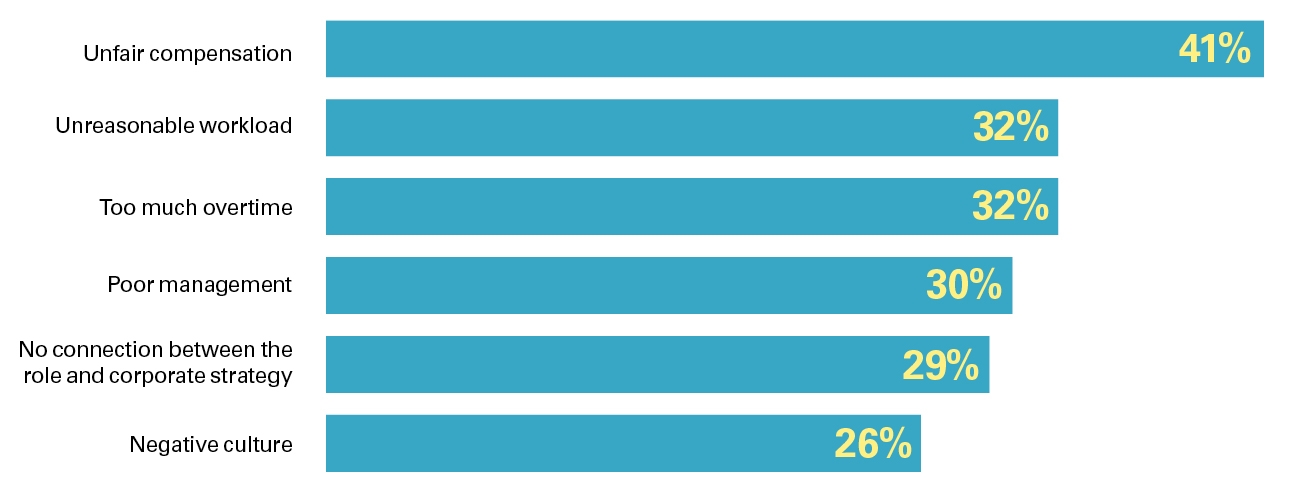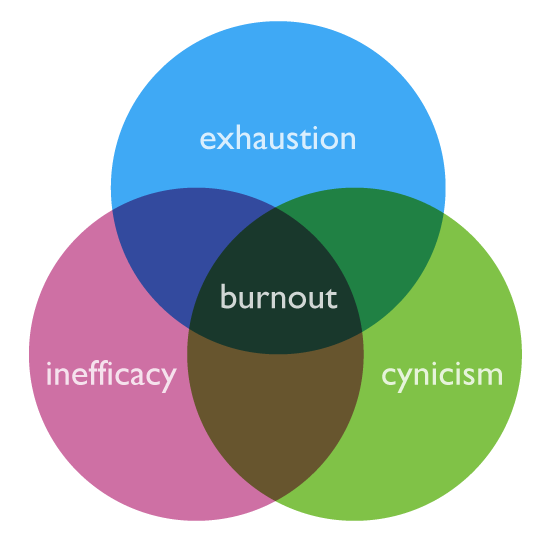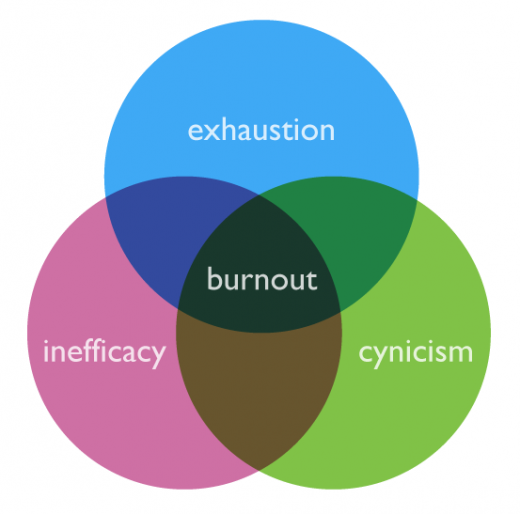The 3 Early Warning Signs of Burnout Before It Destroys Your Career and Relationships
Burnout is like a thief in the night.
One minute you’re highly engaged at work, performing at the top of your game.
The next minute you’re constantly exhausted, anxious and stressed out, as your productivity hits an all-time low. Work is no longer enjoyable and you dread waking up on Morning mornings.
We often ignore the early signs of burnout, partly because we believe it’s an excuse to avoid hard work, and partly because we believe that others depend on us.
But eventually burnout not only hinders our career progress and damages relationships at home, but it also crushes our self-confidence—especially if your self worth is tied to your performance at work.
Here are the 3 early warning signs of burnout and how to prevent them.
The chart below shows the top 6 reasons for burnout as cited by Human Resources Leaders.

Source: Kronos Inc. and Future Workplace study, 2016.
The 3 Early Signs of Burnout
According to burnout research pioneer, Dr. Christina Maslach, burnout is a “prolonged response to chronic interpersonal stressors on the job.” [1]
Burnout is typically associated with feelings of exhaustion, but in Maslach’s book, The Truth About Burnout, she introduces two other key dimensions of burnout and the world’s leading measure of burnout called The Maslach Burnout Inventory.
Here are Maslach’s three dimensions of burnout:

Maslach’s three dimensions of burnout.
1. Overwhelming exhaustion (“I can’t do this anymore”).
2. Feelings of cynicism and detachment from the job (“I can’t wait to leave this horrible job”).
3. A sense of ineffectiveness and lack of accomplishment (“Maybe I’m not cut out for this. I’m just not good enough”).
A high score in only one of these three dimensions is usually an early warning sign of burnout. [2]
Here are a few symptoms of each of these three dimensions of burnout to look out for.
Symptoms of Overwhelming Exhaustion:
1. Excessive workload and fatigue.
Exhaustion is linked with excessive demands at work, which is usually triggered by sudden job layoffs and significant changes in the structure of an organization.
Initially, you may experience prolonged feelings of tiredness. But overtime this may escalate into mental and emotional exhaustion.
2. Insomnia.
Initially, you may struggle to fall asleep for one or two nights during the week.
But overtime, this may escalate into a daily occurence: you constantly feel exhausted, but you can’t fall asleep.
3. Increased occurrence of illness.
Exhaustion weakens the immune system, and increases the likelihood that you’ll frequently experience colds, flu, infections and other illnesses.
Symptoms of Cynicism:
1. Feelings of unfairness.
Cynicism is often triggered when we perceive discrimination and prejudice in the workplace, and/or unfair performance reviews and promotions.
For example, if your complaint on an important issue is ignored, but that of another colleague is heard, feelings of anger and resentment may arise.
2. Loss of enjoyment.
This usually occurs when your initial enthusiasm and passion for work begins to die off, up until the point where you dread going to work and can’t wait to leave before the end of working hours.
Loss of enjoyment also shows up in other areas of life: time with family and friends, hobbies and projects.
3. Feeling undervalued.
This problem usually occurs when we’re not fairly financially compensated for our performance, or feel like our hard work is ignored and underappreciated by the organization.
4. Feeling unethical.
Conflicts between your personal values and those of your organization, will often trigger cynicism—especially if the organization publicly promotes a positive mission statement, but privately engages in unethical practices.
A classic example of this is lying or providing false information to mislead and sell to a potential client.
5. Isolation.
Isolation and feelings of loneliness show up in stages.
At first, we turn away invites to social gatherings we’d normally attend i.e. lunch and drinks with colleagues.
Then, we begin to actively avoid interactions with others, and react negatively when spoken to. Eventually, we feel disconnected and detached from others.
On the extreme end, lack of trust for others and skepticism emerges, as we increasingly believe our colleagues are out to sabotage us.
Symptoms of Ineffectiveness:
1. Feelings of hopelessness.
This issue is most evident when we are overwhelmed by our level of responsibility, but lack insufficient control over resources or authority to get the work done in the most effective way possible.
2. Lack of focus and concentration.
Normally, you’d think of yourself as a highly productive person. But recently, you can barely stay focused for a few minutes without getting distracted by unimportant things.
You’re falling behind on the ever-increasing pile of work, and spend longer hours than necessary completing important tasks.
3. Anxiety and panic attacks.
Initially, you feel more anxious and worried about work than usual.
But as this worsens, you may begin to experience panic attacks.
4. Increased irritability.
This occurs when you feel increasingly aggravated and frustrated by little things you’d usually ignore.
At the extreme end, irritability manifests itself as temper tantrums, extreme mood swings and angry outbursts.
Ask For Help
“Be strong enough to stand alone, smart enough to know when you need help, and brave enough to ask for it.”
? Ziad K. Abdelnour
Most expert recommendations on burnout prevention are nothing new: get a good night’s sleep, take regular breaks from work, eat healthy and so on.
But one can’t help but feel that these solutions are only temporary band-aids that fail to address the root of the problem.
The real problem isn’t burnout. It’s the rapid rise in expectations we’ve placed on ourselves as a society, alongside the current pervasive work culture which shuns those who ask for help as weak and unfit for the job.
We’ve placed an enormous amount of pressure on ourselves to work faster and longer, in efforts to outperform our competition, climb the career ladder and improve our standard of living.
The less busy we are, the more anxious we feel about the security of our future.
And yet, we’re afraid to ask for help when it hurts, out of fear of being perceived as incapable of handling the work.
If instead, we ask for help as soon as the early signs of burnout show up, we’ll not maintain high levels of performance over the long run, but also enjoy the vast majority of our time at work.
This brave act of asking for help varies from person to person.
For some, it’s having a tough conversation with team members about personal struggles with workload, for others its taking several months of sabbatical off work.
In some serious cases, drastic, painful changes need to be made: leaving a high-paying job, relocation, downsizing a home, or significantly slowing down the growth of a business.
Ultimately, prevention is better than cure. Ask for help before it’s too late.
Footnotes
1. Maslach, Christina & Leiter, Michael. (2016). Understanding the burnout experience: Recent research and its implications for psychiatry. World Psychiatry.
2. Maslach, Christina & Leiter, Michael. (2008). Early Predictors of Job Burnout and Engagement. The Journal of applied psychology.
3. The most accurate early warning signs of burnout are usually exhaustion and cynicism.
4. Image credit for three dimensions of burnout by justgrimes (licence).
Business & Finance Articles on Business 2 Community
(56)


